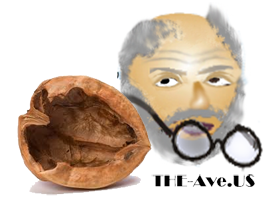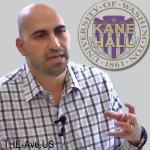
In a nutshell, there is no evidence that Phyllis Wise made her decision about Salaita based on any valid concern with his scholarship. What other basis could there be? Given the similar arbitrary and non academic action she took at the UW against Professor Aprikyan, it is difficult not to imagine that this was a capricious decision made for non academic reasons. More likely, this was a response to expressions of concern ..that is pressure .. from pro Israel donors, alumni and politicians. While, as an academic, I have written about the lies and false statements in Salaita’s talk at the UW, as a Zionist I find Wise’s behavior even worse. Her action weakens the cause of academic freedom and tarnishes the cause of those of us who want Israel to survive.
In a nutshell, the national AAUP has found that there is no evidence that Phyllis Wise made her decision about Salaita based on any valid concern with his scholarship.
This is not new behavior to those of us who remember Dr. Wise’ behavior here at the UW. As Provost, she showed little respect either for faculty legal process or for ethical standards set out in the faculty code. In one example, as Provost she claimed that her consulting agreement with athletic supporter Phil Knight and hisNIKE corporation was immune to the vetting standards required of all other faculty. The conflict of interest was supported by her colleague,rhe UW President MarkEmmert despite the obvious interest in Nike ba a man who wold soon leave the UW to run the NCAA.Even worse as a precedent for the Salaita decision, was Wise’s  arbitrary and non academic action against Professor Andrew Aprikyan, As Provost, Wise and then UW President Emmert, fired Professor Aprikyan despite the finding of an adjudication panel that he had not had due process. Sound familiar?
arbitrary and non academic action against Professor Andrew Aprikyan, As Provost, Wise and then UW President Emmert, fired Professor Aprikyan despite the finding of an adjudication panel that he had not had due process. Sound familiar?
Whether this is or is not true, the appearance of conflict is horrible. I have written about whether a person repeating antisemitic memes used by Louis Farrakhan, might not be equally unqualified in his academic specially .. native American history. Wise’s capricious behavior weakens the cause of academic freedom and tarnishes the cause of those of us who want Israel to survive.
 Today, we are releasing the report of a committee that investigated the case of Steven Salaita (http://www.aaup.org/report/
Today, we are releasing the report of a committee that investigated the case of Steven Salaita (http://www.aaup.org/report/
The report addresses a number of critical issues in this case. Among its findings:
- Professor Salaita’s appointment should have entitled him to the due process rights of a tenured faculty member. Salaita had received a letter in October 2013 offering him the tenured position, subject to board approval. He accepted the offer, received course assignments, resigned from his existing tenured position, sold his house, and put down a deposit on a condo in Illinois before being informed in late summer 2014 that the job offer would not be submitted to the board for approval. The next board meeting with approvals on the agenda was scheduled to occur after Salaita was to start teaching. It has been regular practice at the University of Illinois for the board to formally approve new tenured faculty appointments only after the faculty members have already begun work, a violation of recommendations made by the AAUP and the Association of American Colleges and Universities (AAC&U).
- The rejection of appointment amounted to a summary dismissal, in violation of both AAUP and university policies. The UIUC administration and the board of trustees of the University of Illinois violated the university’s own policies by rejecting Professor Salaita’s appointment without demonstrating cause, and by doing so only after the appointment had been offered and courses had been assigned to him. They also violated the AAUP/AAC&U 1940 Statement of Principles on Academic Freedom and Tenure, which has been endorsed by more than two hundred academic organizations. Aborting an appointment in this manner without demonstrated cause and without due process amounts to a summary dismissal.
- The decision by the chief administrative officer, the chancellor, and the board to reject the appointment contravened widely accepted standards for the conduct of academic governance. The decision was announced without consultation with relevant faculty and administrative bodies. The chancellor announced the decision without even having informed those involved in several previous levels of evaluation, all of whom had recommended making the appointment.
- The climate for academic freedom at UIUC is uncertain. The stated reasons for the rejection of the appointment by the chancellor and the board of trustees have cast a pall of uncertainty over the degree to which academic freedom is understood and respected at UIUC. The report finds that Professor Salaita’s tweets were examples of “extramural expression,” speech as a citizen and hence protected by academic freedom. Claims that his dismissal was intended to protect students were unsupported by any evidence calling into question Professor Salaita’s previous conduct in the classroom. The chancellor and the board claimed on multiple occasions that “civility” is an appropriate standard by which the fitness of a scholar and teacher may be judged, a claim which is inimical to academic freedom.
AAUP investigating committees, which are authorized in a few selected cases when significant violations of academic freedom, tenure, or governance have been alleged and persist despite AAUP efforts to resolve them, are generally composed of AAUP members from other institutions with no previous involvement in the matter. In this case, the Association built upon the work of the UIUC senate’s own Committee on Academic Freedom and Tenure.
The dismissal of Professor Salaita is one of the more significant violations of academic freedom this decade. One may consider the contents of his tweets to be juvenile, irresponsible, and even repulsive and still defend Salaita’s right to produce them. I’m proud to be part of an association that is doing just that. I hope you are too.
— Henry Reichman
Chair, AAUP Committee A on Academic Freedom and Tenure
The mission of the AAUP is to advance academic freedom and shared governance; to define fundamental professional values and standards for higher education; to promote the economic security of faculty, academic professionals, graduate students, post-doctoral fellows, and all those engaged in teaching and research in higher education; to help the higher education community organize to make our goals a reality; and to ensure higher education’s contribution to the common good. Visit the AAUP website and Facebook. Follow us on Twitter.